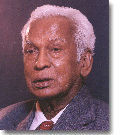iMahal Interview Series:
G. Venkataswamy
June 17, 2001
 iMahal:
It is a great pleasure for us at iMahal to talk with you about your successful ventures in
eye care in India. Before we discuss your career, it would be very helpful to
our readers if they understand where you came from, your early life. In 1918 you were
born in the village of Vadamalpuram, 80km from Madurai. How would you describe
your upbringing? Who was your hero?
iMahal:
It is a great pleasure for us at iMahal to talk with you about your successful ventures in
eye care in India. Before we discuss your career, it would be very helpful to
our readers if they understand where you came from, your early life. In 1918 you were
born in the village of Vadamalpuram, 80km from Madurai. How would you describe
your upbringing? Who was your hero?
 Venkataswamy:
My father was a farmer in a small village in south India. There was no school in my
village. We had to walk a mile and a half across a river to the school in the nearby
village. Every house had a buffalo and the children had to take it out for grazing early in
the morning. We came back home, had some food, and went to school. When a school
was set up in our own village a few years later, we had no pencils or paper, not even a
slate. We used to collect sand from the river bed, spread it smoothly on the ground,
and write in it with our fingers. The school went up to grade five and most of the village
children stopped their studies with that. But my father was keen that I continue my
education. The following year my maternal uncle, who worked as a clerk in a local office
in a nearby town, took me in. For the next eight years I stayed with him and finished
school and two years of college under his care.
Venkataswamy:
My father was a farmer in a small village in south India. There was no school in my
village. We had to walk a mile and a half across a river to the school in the nearby
village. Every house had a buffalo and the children had to take it out for grazing early in
the morning. We came back home, had some food, and went to school. When a school
was set up in our own village a few years later, we had no pencils or paper, not even a
slate. We used to collect sand from the river bed, spread it smoothly on the ground,
and write in it with our fingers. The school went up to grade five and most of the village
children stopped their studies with that. But my father was keen that I continue my
education. The following year my maternal uncle, who worked as a clerk in a local office
in a nearby town, took me in. For the next eight years I stayed with him and finished
school and two years of college under his care.
There are several heroes in my life, starting with my father. He spent his own time and
money to plant hundreds of shade trees around the pools and avenues in our village and
in neighbouring areas. He built a house that was far more advanced in planning and
execution than what a villager would normally build. He practiced good agriculture. He
aimed at perfection in all his works. He was known for being truthful and
straightforward. People did not dare to tell him a lie.
And of course there was Gandhi. When I was under the care of my uncle, Mahatma
Gandhi was in the political forefront of the country, fighting for India's independence.
His followers were everywhere, preaching and practicing his teachings. As small school
boys we started spinning yarn with hand charkas or spindles. We shared the spindles to
thread our yarns and we boycotted foreign goods. My father started wearing khadi home-
spun cloth and I also started wearing it. Gandhiji's ideas of celibacy, non-violence,
truthfulness, and simple life appealed to many people in the younger generation. His
movement was not just political; there was also an effort to review the traditional dharma
or culture of ancient India. The Bhagavad Gita became popular and people started
reading it to understand Kharma yoga. I remember well reading it in those days. But I
didn't understand it then. At the same time Swami Vivekananda became very popular
with us. His speeches were so powerful and inspiring, they made me look forward to
doing something challenging and great. I also read the teachings of Sri Ramakrishna
Paramahamsa, who had very little schooling, but who had known God in person. All
these contacts influenced our thinking greatly in those days. We were not thinking of
amassing money as our goal in life. We always aspired to some perfection in our lives,
like the realization of God, or the reaching of higher level of consciousness in Yoga.



